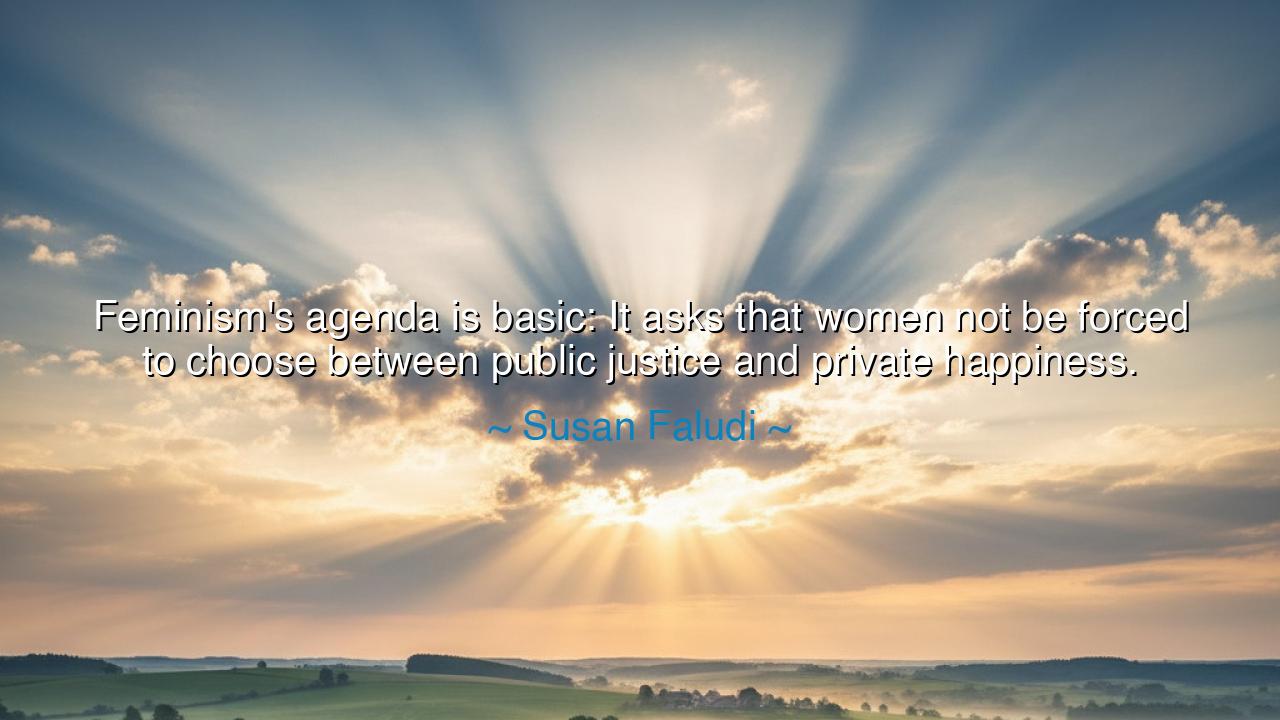
Feminism's agenda is basic: It asks that women not be forced to
Feminism's agenda is basic: It asks that women not be forced to choose between public justice and private happiness.






“Feminism’s agenda is basic: It asks that women not be forced to choose between public justice and private happiness.” — thus spoke Susan Faludi, the chronicler of struggle and truth, who lifted her voice against the silent injustices woven through the fabric of modern life. In her words burns the ancient cry for balance, for the harmony between the world’s demand for duty and the heart’s hunger for love. For ages uncounted, women have borne the double weight of labor and longing—called to serve justice, yet punished for seeking joy. Faludi’s words are not a battle cry of division, but a plea for wholeness, that no soul—woman or man—should have to sacrifice the one to earn the other.
In the ancient days, the poets and philosophers spoke often of justice and happiness, but seldom of those denied the right to both. The city-states of Greece sang hymns to freedom, yet their daughters were silenced within their homes. Even in Rome, where law was worshiped, woman’s virtue was measured by her obedience. So it was that public justice—the realm of law, power, and equality—belonged to men, while private happiness, the realm of hearth and heart, was bound in chains. Faludi’s quote speaks across centuries to this wound: the false belief that to be strong, a woman must forsake tenderness; that to love, she must surrender her power.
Consider the life of Eleanor Roosevelt, a woman of noble heart and unyielding spirit. In her youth, she was told to remain silent, to be content as a shadow beside a powerful man. Yet she rose, not by rebellion alone, but by integrating justice with compassion. She fought for human rights across the earth, while still keeping alive her deep capacity for kindness and love. She did not choose between public justice and private happiness—she built a bridge between them, showing that the strength of a woman’s soul lies not in division, but in union.
This is the true essence of feminism, misunderstood by those who see only its surface. It does not seek to erase the differences between man and woman, but to restore balance to a world tilted too long toward one side. It calls for a time when a woman may sit in council or cradle, in parliament or garden, and be seen as whole. When her voice in the marketplace carries as much reverence as her laughter in the home. For justice without joy is hollow, and happiness without freedom is a cage.
Let us speak of the great paradox Faludi reveals: that the world often asks its women to pay a price no one else is asked to bear. If they labor for justice, they are called cold; if they seek love, they are called weak. But the truth is neither—and the lie has cost generations their peace. For when one half of humanity is torn between duty and desire, the other half too becomes unbalanced, and the world itself loses its harmony. A society that denies its women their full humanity denies itself its own soul.
The ancients would have called this the teaching of the Two Fires—the outer fire of action, and the inner fire of love. Both must burn together to light the world. To ask a woman to choose between them is to extinguish the sacred flame within her. Thus Faludi’s call is not merely political, but spiritual: a reminder that justice and happiness are not opposites, but twin pillars of the human condition. A civilization endures not by strength alone, but by the balance of heart and law, of tenderness and truth.
Therefore, let those who listen take this wisdom into their own lives. Do not ask your daughters to harden their hearts to succeed, nor your sons to silence their compassion to lead. Build homes and workplaces alike where justice breathes beside joy, where equality does not come at the cost of peace. Let every woman know she may love deeply and still rise boldly; that her laughter is as revolutionary as her courage.
And when future generations speak of our time, let them say we understood this sacred teaching: that to live fully is to weave together the threads of public justice and private happiness into a single, shining tapestry. For only then will humanity itself be whole—when no one, man or woman, must choose between the freedom of their spirit and the joy of their heart.






AAdministratorAdministrator
Welcome, honored guests. Please leave a comment, we will respond soon